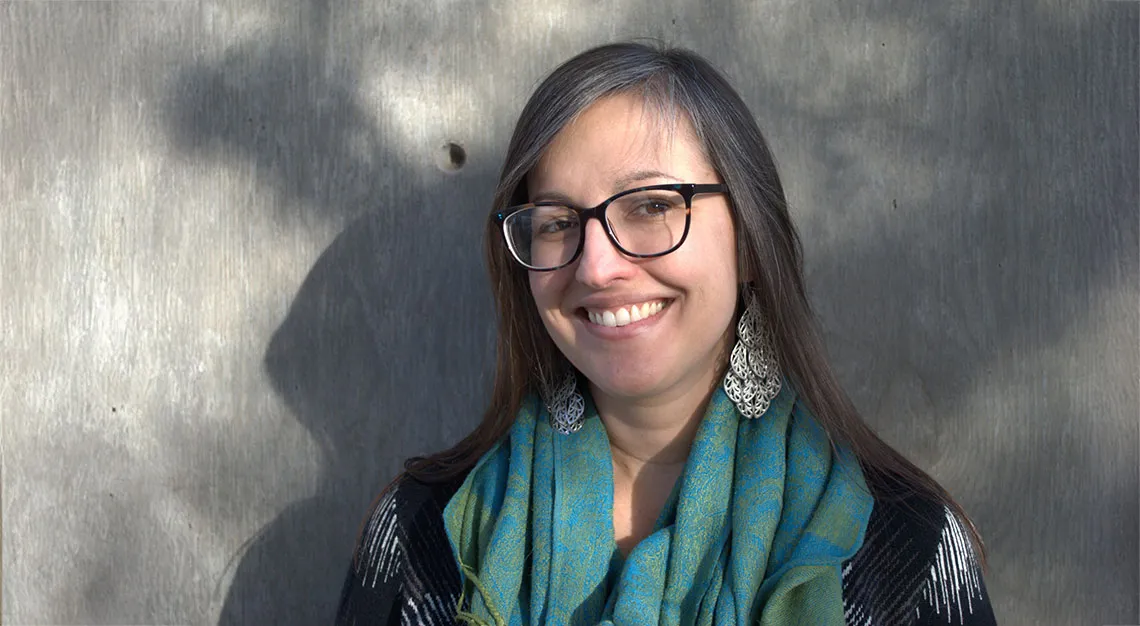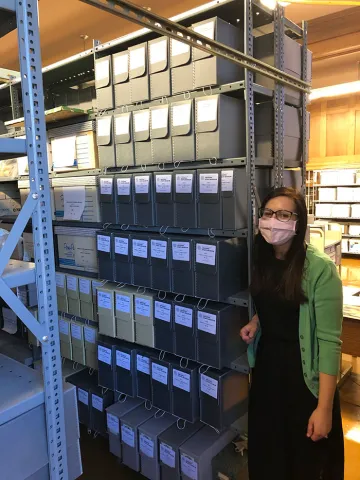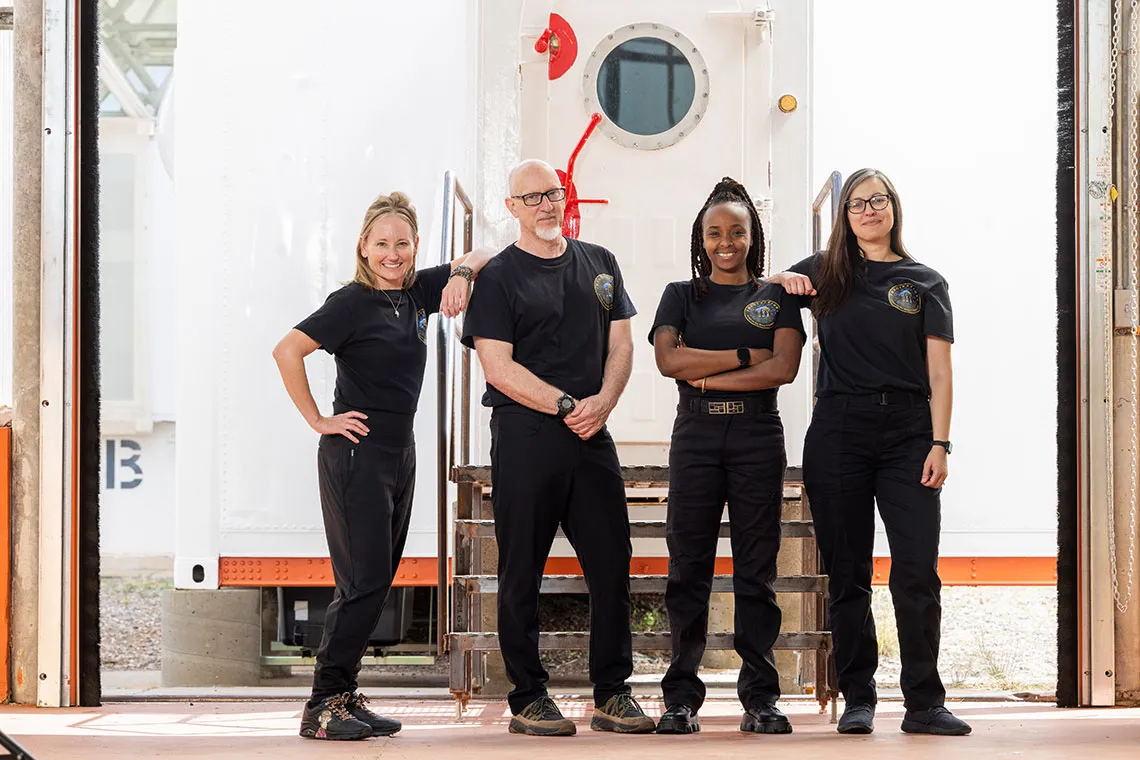From 19th-Century Pennsylvania to the Moon: Archivist and Outreach Librarian Julie Swarstad Johnson, MLIS ’20
INFOSCI ALUMNI PROFILE

Julie Swarstad Johnson, MLIS '20, Archivist and Outreach Librarian for the University of Arizona Poetry Center. Photo by Paola Valenzuela.
Archivist and Outreach Librarian, University of Arizona Poetry Center
Archives have been important to me as a writer: my first collection of poetry emerged from archival and field research…. [and in my current job] I use the knowledge I gained through my archives courses and internship on a daily basis.
Julie Swarstad Johnson, a lifelong Arizonan who “fell in love with Tucson’s quirky charm,” graduated from the University of Arizona Master of Arts in Library and Information Science in 2020, following her 2013 MFA in Creative Writing from Penn State University and undergraduate degrees in anthropology and creative writing from the University of Arizona in 2010. She is the archivist and outreach librarian at the U of A Poetry Center as well as an award-winning poet who recently completed a “mission” to the moon.
Why did you decide to pursue a Master’s in Library and Information Science?
Although I’ve loved libraries since childhood, I found my way into this profession by happenstance. In 2015, I started at the University of Arizona Poetry Center as a library assistant, mainly staffing the front desk; as a poet, I was just thrilled to find a job that immersed me in poetry. The Poetry Center is home to one of the largest library collections of contemporary poetry in North America, with more than 80,000 items—truly a poet’s dream. Quickly, however, I realized that I also love the work of libraries: connecting people with information. Inspired and encouraged by my colleagues Wendy Burk and Sarah Kortemeier—both U of A MLIS grads and poet-librarians—I started the MA in Library and Information Science program when the right time came around.

Julie Swarstad Johnson with her capstone project focus: the William A. Longacre papers, fully processed and shelved at the Arizona State Museum. Photo courtesy Julie Swarstad Johnson.
Did you have a particular area of interest or focus in your program of study?
Archives have been important to me as a writer: my first collection of poetry, Pennsylvania Furnace, emerged from archival and field research into 19th-century ironmaking in central Pennsylvania and took me into archives everywhere from universities to tiny county historical societies. When I started my MLIS, I knew I wanted to gain professional knowledge and experience in that area, so I took any classes relevant to archives that were available (although I didn’t complete the archives certificate due to time). I also sought out an internship in archives to get as much practical knowledge as possible. After graduating, I eventually became the Poetry Center’s first-ever professional archivist (we’ve always had a library mindset, despite having an exceptional online audiovisual archive, Voca), and I use the knowledge I gained through my archives courses and internship on a daily basis.
Tell us about your capstone project in the MLIS.
My capstone internship at the Arizona State Museum was the true highlight of my experience in the MLIS program. Molly Stothert-Maurer, head of ASM’s Library & Archives, was an excellent mentor, and under her direction, I processed two different collections, one an addition to a smaller collection, and the other, a sprawling, partially processed collection that was a major undertaking. The second, the William A. Longacre papers, 1937-2016, provided a real challenge in terms of arrangement, making it incredibly educational! Molly recently shared that a delegation from the Philippines will be consulting the Longacre papers this summer to support artifact repatriation—a real dream in terms of what archival work can make possible.
What have you found most surprising, delightful or unexpected in your daily work?
The Poetry Center is a small shop: just three library staff for our remarkable collections! The upshot is that I get to do a little bit of everything, from buying books to cataloging to curating exhibitions to working with archival collections to reference services and beyond. During the pandemic, we started a podcast, Poetry Centered, to make our audiovisual archive more approachable, and I’ve continued to produce it. Right now, I’m working on a long-term project to make our extensive collection of chapbooks (short, pamphlet-style books) more accessible by moving them into our public reading room. This effort began as a project for LIS 541 Preservation, and has evolved over time into a major effort to rehouse this unique collection. Every day at the Poetry Center is different, and I am incredibly grateful to work with wonderful colleagues who encourage creativity and care in that ever-changing context.

The Imagination 1 crew (Elizabeth George, Christopher Cokinos, Ivy Wahome and Julie Swarstad Johnson). Photo Chris Richards / University Communications.
Tell us about your “mission” to the moon!
This spring, I had the unique opportunity to be part of Imagination 1, a simulated mission to the Moon with an all-artist crew. I spent six days at SAM (the Space Analog for the Moon and Mars, located at the university’s Biosphere 2) inside a hermetically sealed “Moon base,” writing poetry and tending to the habitat. The crew—nonfiction writer Christopher Cokinos, dancer/choreographer Elizabeth George, textile artist Ivy Wahome and me, all from the University of Arizona—had an incredibly fruitful time together, both making art and thinking about how we might live a sustainable, ethical, beautiful life, both in space and here on Earth. I’m looking forward to the writing that will come out of this experience in the future. Read an account of the mission that Chris wrote for Esquire.
Learn more about the MA in Library and Information Science, or explore ways you may support InfoSci faculty and students who are shaping the future of information.

